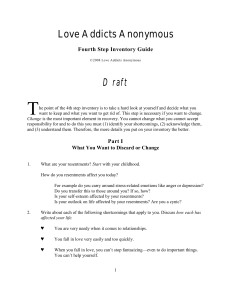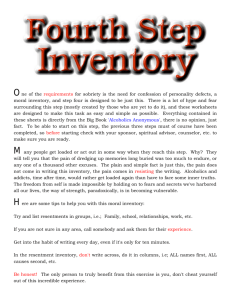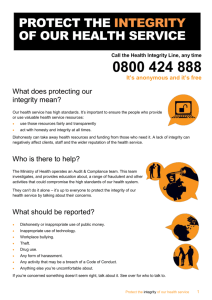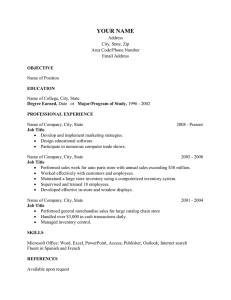4th Step Guide
advertisement
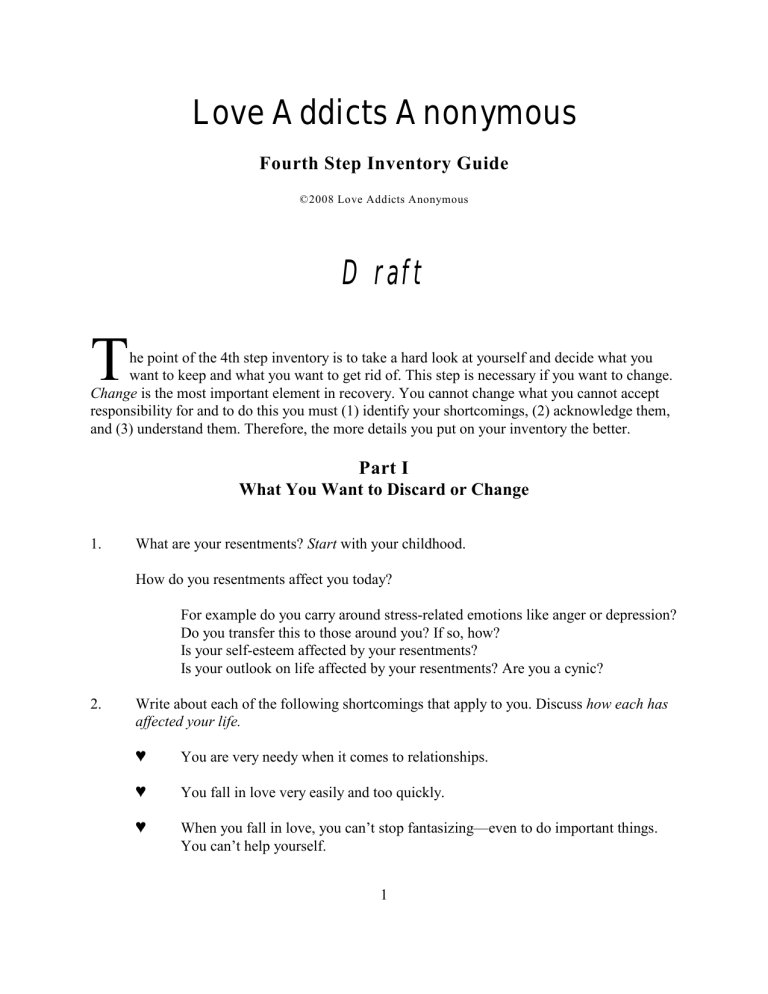
Love Addicts Anonymous Fourth Step Inventory Guide ©2008 Love Addicts Anonymous Draft T he point of the 4th step inventory is to take a hard look at yourself and decide what you want to keep and what you want to get rid of. This step is necessary if you want to change. Change is the most important element in recovery. You cannot change what you cannot accept responsibility for and to do this you must (1) identify your shortcomings, (2) acknowledge them, and (3) understand them. Therefore, the more details you put on your inventory the better. Part I What You Want to Discard or Change 1. What are your resentments? Start with your childhood. How do you resentments affect you today? For example do you carry around stress-related emotions like anger or depression? Do you transfer this to those around you? If so, how? Is your self-esteem affected by your resentments? Is your outlook on life affected by your resentments? Are you a cynic? 2. Write about each of the following shortcomings that apply to you. Discuss how each has affected your life. Ì You are very needy when it comes to relationships. Ì You fall in love very easily and too quickly. Ì When you fall in love, you can’t stop fantasizing—even to do important things. You can’t help yourself. 1 Ì Sometimes, when you are lonely and looking for companionship, you lower your standards and settle for less than you want or deserve. Ì When you are in a relationship, you tend to smother your partner. Ì More than once, you have gotten involved with someone who is unable to commit— hoping he or she will change. Ì Once you have bonded with someone, you can’t let go. Ì When you are attracted to someone, you will ignore all the warning signs that this person is not good for you. Ì Initial attraction is more important to you than anything else when it comes to falling in love and choosing a partner. Falling in love over time does not appeal to you and is not an option. Ì When you are in love, you trust people who are not trustworthy. The rest of the time you have a hard time trusting people. Ì When a relationship ends, you feel your life is over and more than once you have thought about suicide because of a failed relationship. Ì You take on more than your share of responsibility for the survival of a relationship. Ì Love and relationships are the only things that interest you. Ì In some of your relationships you were the only one in love. Ì You are overwhelmed with loneliness when you are not in love or in a relationship. Ì You cannot stand being alone. You do not enjoy your own company. Ì More than once, you have gotten involved with the wrong person to avoid being lonely. Ì You are terrified of never finding someone to love. Ì You feel inadequate if you are not in a relationship. Ì You cannot say no when you are in love or if your partner threatens to leave you. 2 Ì You try very hard to be who your partner wants you to be. You will do anything to please him or her—even abandon yourself (sacrifice what you want, need and value). Ì When you are in love, you only see what you want to see. You distort reality to quell anxiety and feed your fantasies. Ì You have a high tolerance for suffering in relationships. You are willing to suffer neglect, depression, loneliness, dishonesty—even abuse—to avoid the pain of separation anxiety (what you feel when you are not with someone you have bonded with). Ì More than once, you have carried a torch for someone and it was agonizing. Ì You love romance. You have had more than one romantic interest at a time even when it involved dishonesty. Ì You have stayed with an abusive person. Ì Fantasies about someone you love, even if he or she is unavailable, are more important to you than meeting someone who is available. Ì You are terrified of being abandoned. Even the slightest rejection feels like abandonment and it makes you feel horrible. Ì You chase after people who have rejected you and try desperately to change their minds. Ì When you are in love, you are overly possessive and jealous. Ì More than once, you have neglected family or friends because of your relationship. Ì You have no impulse control when you are in love. Ì You feel an overwhelming need to check up on someone you are in love with. Ì More than once, you have spied on someone you are in love with. Ì You pursue someone you are in love with even if he or she is with another person. Ì If you are part of a love triangle (three people), you believe all is fair in love and war. You do not walk away. 3 3. Ì Love is the most important thing in the world to you. Ì Even if you are not in a relationship, you still fantasize about love all the time— either someone you once loved or the perfect person who is going to come into your life someday. Ì As far back as you can remember, you have been preoccupied with love and romantic fantasies. Ì You feel powerless when you fall in love—as if you are in some kind of trance or under a spell. You lose your ability to make wise choices. Ì You like to create drama and excitement. Ì You have weak personality boundaries. You let people abuse you or take advantage of you. You do not know where you leave off and someone else begins. You do not know who you are or what you want. Ì You have low self esteem. Ì You feel the compelling need to control using one or more of the following. Image Management Nagging Being Helpless Projecting Guilt Stimulating Jealousy Flattery The Silent Treatment Sex Caretaking (doing for someone what they should be doing for themselves) Hysteria or rage Excessive phone calls or emails Driving by someone’s home Ì You fear intimacy or commitment in healthy relationships Other General Defects You Might Consider Writing About: SELF-PITY: You feel sorry for yourself all the time. You wallow in your sorrows. You magnify your troubles. You think that you are different. You blame your problems on others. You withdraw from the world. You feel that no one understands or loves you. You feel things are hopeless and that you are a victim of circumstances. 4 SELF-WILL: You are in collision with something or somebody (even with good motives). You are into yourself totally regardless of the consequences. DISHONESTY: You are not being honest with yourself or other people. You are lying. You are cheating and depriving others of not only their worldly goods but their emotional security and peace of mind. You are justifying your behavior—using alibis and stealing trust. SELF-DESTRUCTION: You are harming and sabotaging yourself, or anything good that comes into your life. SLOTH: You procrastinate and are lazy. You continually put off things that need to be done now. You are complacent. GLUTTONY: You engage is excessive eating, drinking, shopping, gambling. You are taking your comfort to the extreme. You have a compulsion to overindulge. RATIONALIZATION: You imagine that you have good motives and reasons when you really don’t. PERFECTIONISM: You are unwilling to accept human mistakes—yours and those of others. You set unrealistic standards for yourself and others, then become frustrated and resentful if they are not met, believing your standards are the only right ones. IMPATIENCE: You want what you want, and you want it now. You are not living in the here and now. You have the inability to delay gratification. Feel free to add shortcomings that will complete your fourth step inventory. 4. Discuss the people you have harmed. When you do the 8th step you will need this information. Now let’s move on to your assets . . . 5 Part II Your Assets. What You Want to Keep and Improve What You Like About Yourself Ì Personality traits—I am . . . Patient Kind Intelligent Insightful Creative Compassionate Optimistic _____________ _____________ _____________ _____________ Ì Helping Others: What do you do for others? Ì Strength and Perseverance: Are you a survivor? _____________ ____________ _____________ ____________ Please add to this list as things come to you. © 2008 Love Addicts Anonymous www.loveaddicts.org 6
